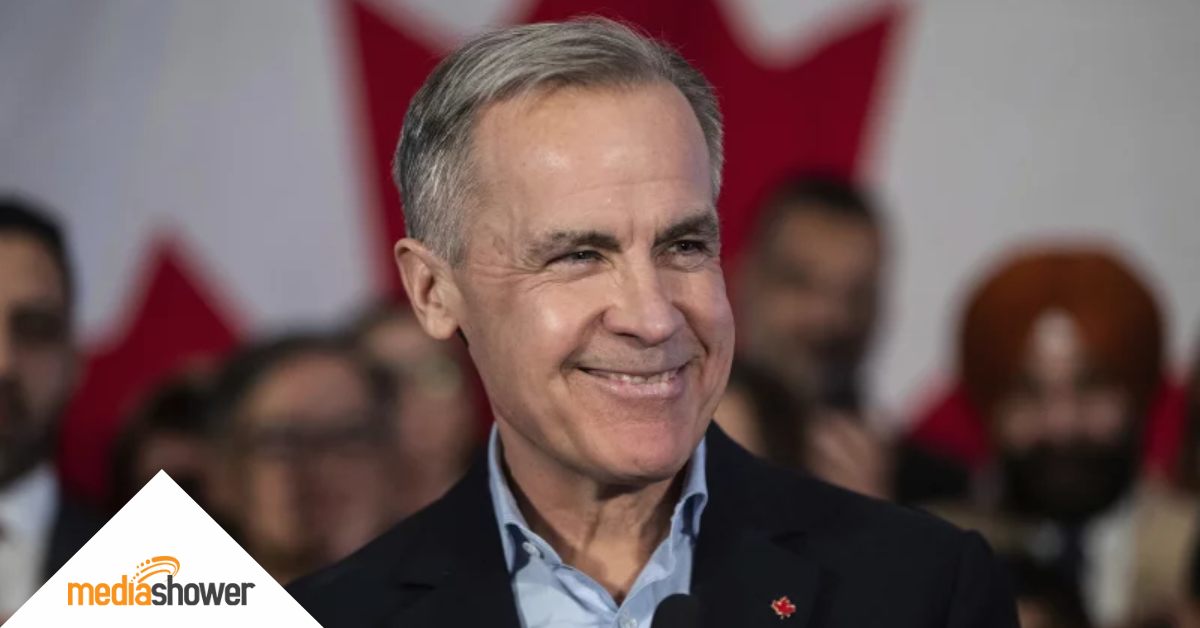
Mark Carney’s rise from international finance to national leadership happened in a political moment that badly needed economic steadiness. Canadian housing costs are squeezing families out of their communities. Inflation is chipping away at savings. People are anxious and exhausted.
Into that climate walked a candidate fluent in the language of markets and the rhythms of ordinary life.
Initially, Carney’s background as the former governor of two central banks wasn’t much comfort to voters. They weren’t looking for economic theory. They needed someone who could make sense of their financial stress.
Carney made the pivot, relating to voters on a human level, not just a policy wonk. When he addressed the nation for the first time as prime minister-elect, he spoke to them as someone who genuinely understood grocery bills and mortgage payments.
In a campaign where he was a clear underdog, Carney’s last-minute win is a communication success story.
How Mark Carney Won Canada With Calm, Clarity, and Credibility
Mark Carney’s rise from international finance to national leadership happened in a political moment that badly needed economic steadiness. Canadian housing costs are squeezing families out of their communities. Inflation is chipping away at savings. People are anxious and exhausted.
Into that climate walked a candidate fluent in the language of markets and the rhythms of ordinary life.
Initially, Carney’s background as the former governor of two central banks wasn’t much comfort to voters. They weren’t looking for economic theory. They needed someone who could make sense of their financial stress.
Carney made the pivot, relating to voters on a human level, not just a policy wonk. When he addressed the nation for the first time as prime minister-elect, he spoke to them as someone who genuinely understood grocery bills and mortgage payments.
In a campaign where he was a clear underdog, Carney’s last-minute win is a communication success story.
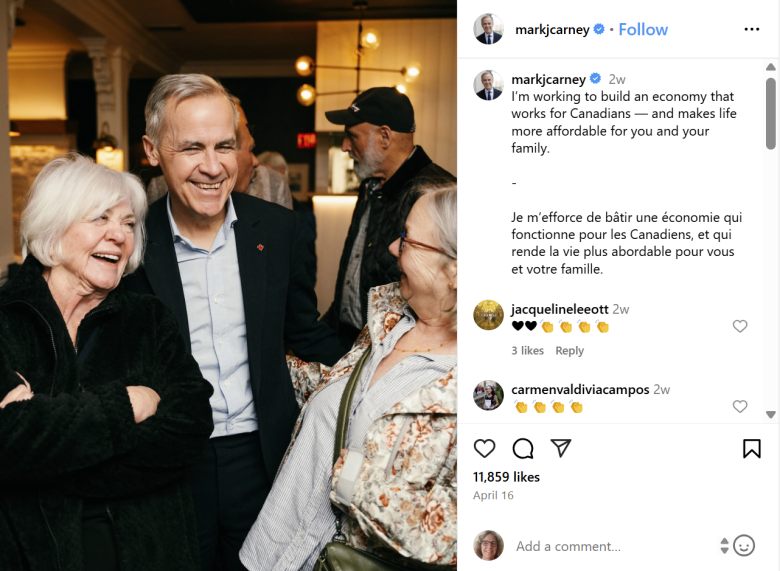
Source: Instagram
A Language Few Could Speak
From Global Finance to Main Street
Before politics, Carney built a reputation that stood out on the world stage. He was a trusted figure in international finance, someone who moved comfortably among central bankers, G7 ministers, and Wall Street veterans.
But what made him stand out on the campaign trail was his ability to take the most complicated economic issues and bring them home to voters in Thunder Bay, Moncton, or Yellowknife.
He’d explain inflation like this: “It’s when your morning coffee costs more loonies than it used to.” Referring to the Canadian one-dollar coin, the concept suddenly felt personal.
Multilingual Connection
Carney’s communication skills extended beyond finance. He was fluent in both English and French, of course, but also respectful of Indigenous languages and traditions. He adapted his tone and content for each audience.
He didn’t just speak to people—he spoke like them. That adaptability reinforced his message: Economics should work for everyone, not just the elite.
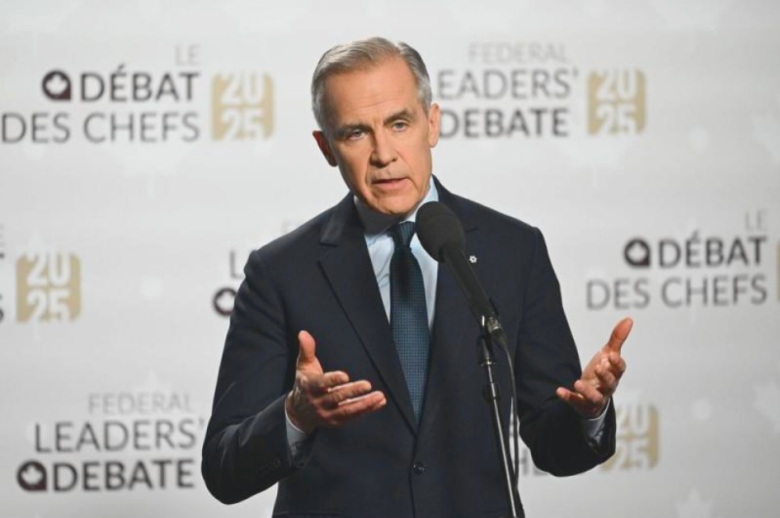
The Political Context
Economic Anxiety Across Canada
The Canada Carney stepped into as a candidate was still feeling the aftershocks of the pandemic. Housing was increasingly out of reach. Interest rates were up, but optimism wasn’t.
A generation of young Canadians wondered if the financial security their parents enjoyed had quietly vanished.
A Fractured Field
The political landscape mirrored that anxiety. The Liberal government, led by a weary Justin Trudeau, was struggling to maintain momentum.
Pierre Poilievre’s Conservatives were gaining traction with populist economic messaging. Other parties, including the NDP and the Bloc Québécois, were fighting for space in a fragmented field.
Carney, by contrast, was entering politics for the first time. He brought the demeanor of someone who had spent his career outside the partisan fray.
He wasn’t polished for political combat, but he was steady and serious. In a moment defined by volatility, that proved to be a strategic asset.
A campaign ad addressing the housing shortage.
The Campaign Communication Strategy
Economics as Storytelling
Carney’s speeches sounded less like stump speeches and more like fireside chats about the economy. He used personal anecdotes to frame complex policies. When he spoke about housing, he introduced real people.
He didn’t rush his points. He laid them out carefully, building understanding piece by piece. It wasn’t flashy, but it was effective.
“Sarah and Mike here are both teachers. They work hard, save smart, and still can’t afford to live in their hometown.”
Platform-Specific Approaches
He adjusted his focus based on the audience, but not his tone. In New Brunswick, he spoke about tidal energy and local economic resilience. In Alberta, he met with oil workers to discuss job transitions in a carbon-conscious economy.
In Quebec, he addressed economic nationalism with fluent French and an appreciation for cultural nuance.
Online, his campaign avoided overproduced videos. Instead, voters saw behind-the-scenes clips of Carney sketching economic scenarios on a whiteboard. They weren’t slick, but they were sincere, and they showed the math behind his message.
Handling Criticism with Context
Critics tried to brand him as an out-of-touch elitist. “Mr. Goldman Sachs” became a shorthand attack. But Carney didn’t deflect. He responded with personal stories about his grandmother’s grocery habits during the Depression or his father’s early career as a teacher in rural Alberta.
He answered policy questions with lived experience rather than talking points.
Reassuring a worried nation.
When Experience Became an Edge
Carney didn’t begin the campaign as a frontrunner. Early polls had him trailing, and critics questioned whether a former central banker could connect with voters outside the financial core.
That changed on February 1, when the U.S. announced tariffs on Canadian lumber, dairy, and other key exports. Suddenly, Carney’s global experience became a lifeline.
His years working with the Federal Reserve and G7 finance ministers gave him something the moment demanded: credibility in a crisis.
Even outgoing Liberal ministers acknowledged it—Carney was the “one person who could get Washington on the phone.” That perception changed the narrative.
What once looked like elite credentials was suddenly a practical advantage.
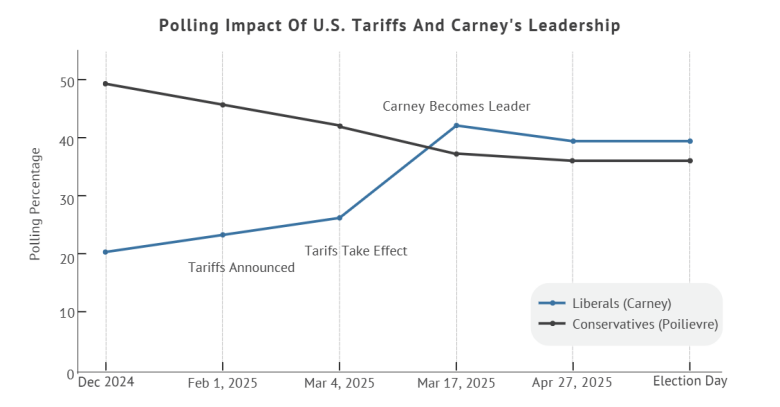
Walking the Walk
The Personal Made Political
Carney’s early life story helped reinforce his campaign message. He was raised by educators and had lived in several provinces, including time in the North. He understood regional differences from experience.
His message—that economic policy must serve all Canadians—wasn’t just rhetoric. It reflected his own upbringing.
“Leadership is the acceptance of responsibility rather than the assumption of power.”
– Mark Carney, Value(s): Building a Better World for All
Environmental Economics
One of the clearest contrasts between Carney and his rivals was how he connected climate action to economic stability. He didn’t talk about climate change as a moral imperative alone. He called it a financial risk.
That framing helped him bring reluctant voters into the conversation without triggering resistance. “We’re not just going green—we’re future-proofing our finances,” he said.
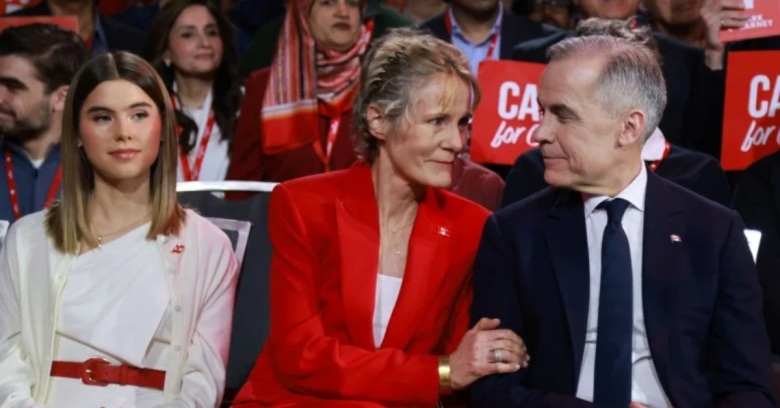
Family as Symbol
While Carney’s international résumé could have reinforced his image as part of the global elite, his family helped humanize that perception. Married to British economist Diana Fox-Carney, with daughters who had lived and studied abroad, Carney embodied a global perspective—but he framed it through a Canadian lens.
In speeches and interviews, he emphasized shared values like education, public service, and community—values rooted in his upbringing across Canadian provinces. Rather than appearing disconnected, his family’s story helped reinforce his choice to return home and serve.
That story helped voters see Carney not as an outsider, but as someone who had chosen to serve Canada with the full weight of his global knowledge.
The Victory Speech
Opening with inclusion
On election night, Carney opened his speech with acknowledgments in multiple languages. He didn’t lead with slogans. He led with thanks—to regions, communities, and specific people who had fueled his campaign.
Grounding policy in reality
He quickly moved into policy—but framed it in terms voters had heard throughout the campaign. Each sentence reinforced a shared sense of purpose.
“Every family making hard choices at the checkout counter—I see you. Every young person wondering if the Canadian dream still includes home ownership—I hear you.”
Measurable promises
Instead of grand visions, Carney offered a 100-day plan with clear goals: housing relief, productivity forums, provincial healthcare talks. He outlined priorities with timelines and measurable goals.
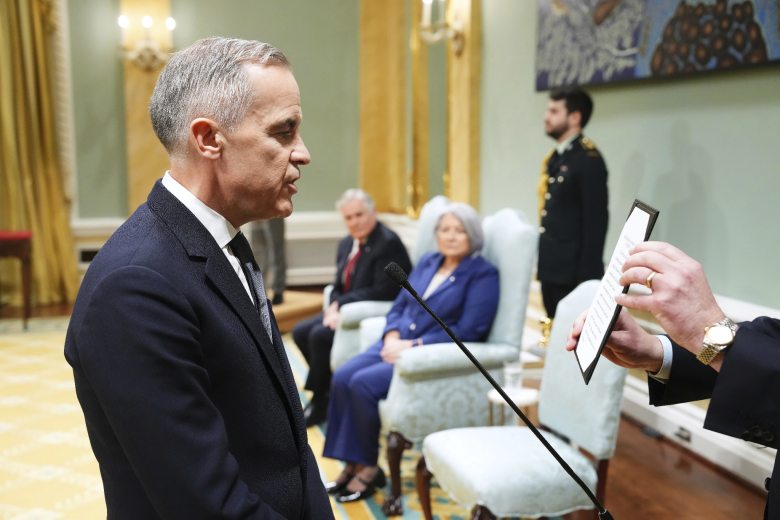
A Final Word
Mark Carney’s win was powered by clarity, not personality cult or partisan flash. He took a complex system—the global economy—and showed how it intersects with everyday life. He offered voters something they hadn’t seen in a while: a leader who didn’t just know the numbers, but knew how to make them matter.
“Be humble. However grand you are today or may become tomorrow, you too will be forgotten.”
Marketer Takeaways
Carney’s rise offers practical lessons for communicators:
- Make expertise accessible. Real authority means being able to explain the complex in plain terms.
- Stay consistent across platforms. Carney didn’t change his core message; he simply adapted the delivery.
- Lead with empathy, not ego. Every answer acknowledged the emotional weight behind the economic questions. He showed Canadians that he cared.
- Answer criticism with real stories. Personal experience adds dimension that data alone can’t provide.
- Don’t chase flash. Calm, controlled messaging often builds more trust than charisma.


